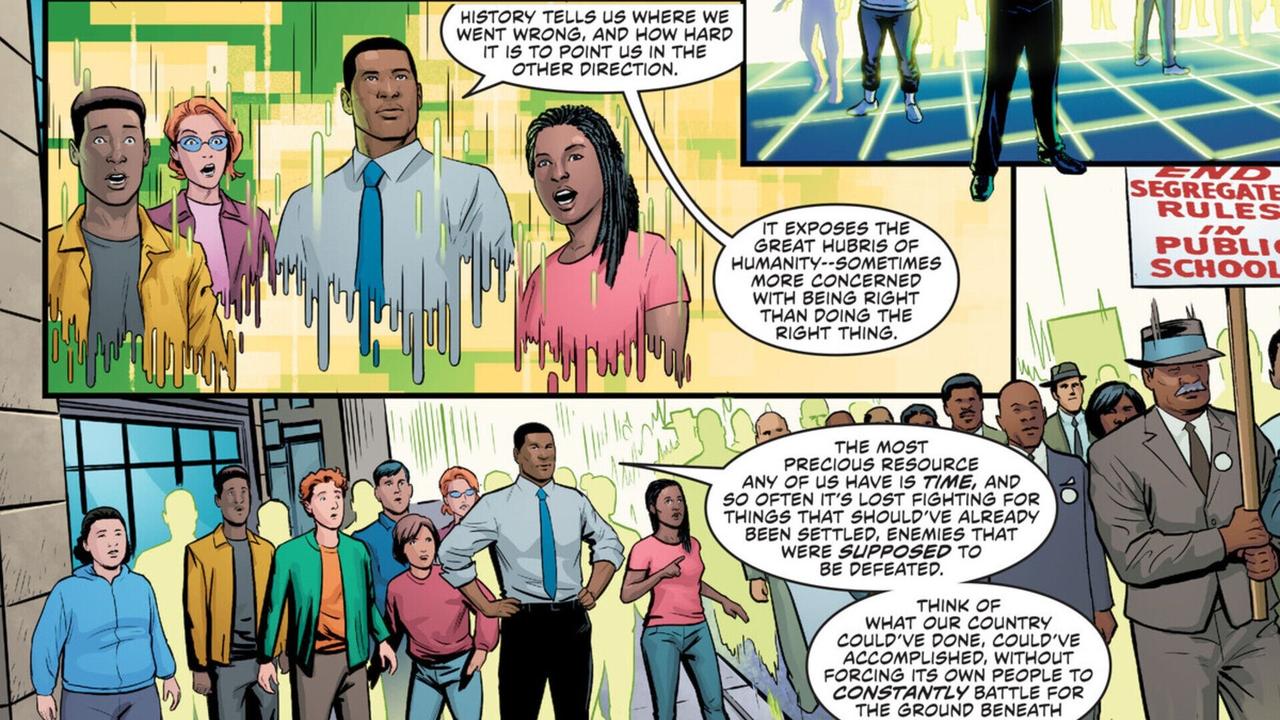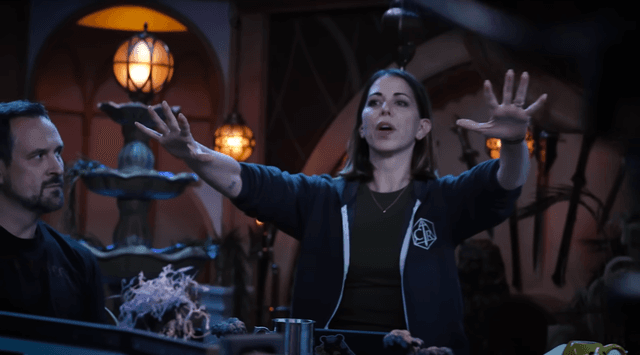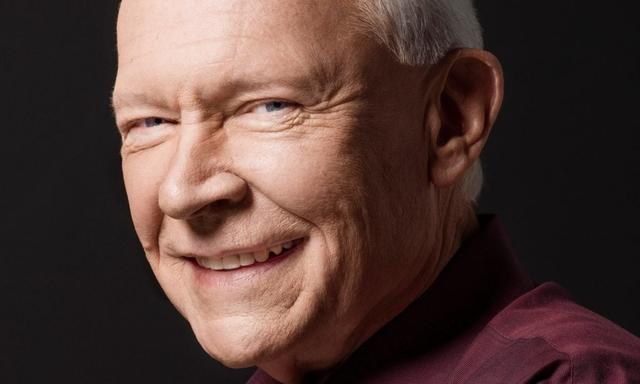If you click on a link and make a purchase we may receive a small commission. Read our editorial policy.
Black Lightning and the crisis of conscience inside the Lex Luthor White House
A controversial moment from Black Lightning’s history is revisited, with his tacit support of President Lex Luthor. Here’s why Jefferson Pierce agreed to fall in behind Superman’s nemesis.

Jefferson Pierce was a hero a long time before he created the superhero mantle of Black Lightning, dedicating his life and career towards public education by working as a high school principal in Metropolis’ notorious Suicide Slum neighborhood. Jefferson would make an immense personal sacrifice and moral compromise by agreeing to serve as the Secretary of Education on Lex Luthor’s US presidential cabinet. This decisive moment in Black Lightning’s history is revisited in the educationally-minded comic book anthology special DC's Saved by the Belle Reve #1 in a short story by Brandon Thomas and Craig Cermak. Thomas and Cermak delve directly into why Jefferson would make such a decision as he stands among the rest of the cabinet to pledge his begrudging allegiance to the newly inaugurated President Luthor.
Here’s how Black Lightning justifies his tacit support of and recruitment into the Luthor Administration, the short-lived history of the Luthor Presidency within the DC Universe, and how Luthor’s time as Commander-in-Chief feels even more relevant and resonant than ever 18 years after its explosive end.
Spoilers ahead for DC's Saved by the Belle Reve #1.
Why Black Lightning joined the Luthor administration

Thomas and Cermak’s short story 'This Is Why,' is framed by Jefferson joining the rest of Luthor’s recently appointed cabinet to vocally express their support for their president. As all sorts of conniving types, leering at a supervillain being lawfully elected to the highest office in the United States and being given the keys to the federal government’s executive branch, it falls on Jefferson to take his turn in figuratively kissing the ring to express his loyalty to the President. Visibly straining under the public display of submission and fealty, Jefferson immediately begins thinking back on why exactly he took on such a controversial career decision in the first place.
For Jefferson, the answer of why he does what he does in education always comes down to giving the students the support that eludes so many nationwide in the public school system. Even with a cabinet position, Jefferson makes a dedicated effort to continue to keep up with his students at his old school, meeting each of them with their individual needs and encouraging them to learn and grow. With all of the advanced resources available to them under Jefferson’s connection to the Luthor Administration, the educator and superhero quietly admits that he can do more good within the cabinet while privately recognizing Luthor’s obvious villainous overtones.
Thinking of each of his current students as Luthor calls on him, Jefferson publicly thanks the President for the opportunity to join his cabinet and compliments him on his leadership skills, appeasing the Supervillain-in-Chief. The statement is a visibly hard one for Jefferson to make, with his clenched fists crackling with electrical energy but Black Lightning falls in line on behalf of the American people and the electorate’s decision.
How Lex Luthor became President of the United States

Despite years of battling Superman and manipulating Metropolis and the wider DCU as sinister corporate overlord, Luthor successfully ran for President in the 2001 one-shot special Lex Luthor 2000 #1 by Jeph Loeb, Tony Harris, and Ray Snyder. Luthor’s path to the presidency was a relatively legitimate one, at least free of visible electoral interference as the American people willingly voted him into the White House, though the path to his candidacy was a more underhanded one.
During the JLA storyline 'Rock of Ages,' by Grant Morrison, Howard Porter, and John Dell, the Injustice Gang acquires the Worlogog, an ancient artifact capable of rewriting reality. In the hands of the Joker, the Clown Prince of Crime uses the Worlogog to clear Luthor’s public reputation of any wrongdoing, effectively giving Superman’s nemesis a legal clean slate. With his name wrongfully cleared, Luthor then set his sights on Gotham City.
After Gotham was devastated by a massive earthquake in the 1999 crossover event 'No Man’s Land,' it was Luthor who spearheaded the rebuilding efforts after the municipality was officially reintegrated into the United States. This seemingly altruistic campaign endeared Luthor to millions of Americans while causing the current presidential administration’s standing in the polls to plummet, leading to Luthor’s electoral triumph. While Superman publicly respects the decision of the American public, he destroys one of Saturn’s moons in a rage at the election results. Luthor appoints Clark Kent’s childhood friend Pete Ross as his Vice President while both General Sam Lane and Jefferson Pierce accept appointments to Luthor’s presidential cabinet.
The end of the Luthor administration

Jefferson’s tenure as the Secretary of Education would not last the entire duration of the presidency though not entirely of Jefferson’s own accord. After accepting his cabinet position in Superman #166 (vol. 2) by Loeb, Ed McGuinness, and Cam Smith, Jefferson intended to retire from his superhero career to focus on his commitment to education. This proved short-lived, with Black Lightning suiting up in the 2004 Outsiders storyline 'Devil’s Work,' by Judd Winick, Tom Raney, and Scott Hanna to help his daughter Anissa and the Outsiders battle the magical supervillain Sabacc. With Jefferson’s double life as a superhero already something of an open secret within the White House, acting President Pete Ross privately asked for Jefferson’s resignation, with Jefferson complying.
Ross' succession as President of the United States following Luthor came when Lex became increasingly unstable by secretly dosing himself with Venom laced with synthetic Kryptonite due his paranoia that Superman may someday attempt to overthrow him, with the matter coming to a head in the Superman/Batman storyline 'Public Enemies' by Loeb, McGuinnes, and Dexter Vines. Publicly blaming Superman for a coming meteor largely composed of Kryptonite, Luthor ordered heroes serving the government to bring the Man of Steel into custody, along with Batman for serving as his accomplice. When Luthor admitted that he had no evidence the meteor was linked to Superman along with the admission that he made illegal arms deals with Darkseid to defend Earth from Imperiex, the confession was recorded and internationally broadcast, resulting in Luthor going on the run as a criminal, no longer fit for public office, ending this bitter chapter in DCU history for good.
The bitter real-life parallels

Luthor’s presidency came at a time when the United States had just emerged from the closely scrutinized and contested 2000 U.S. presidential elections between George W. Bush and Al Gore. In the 20 years since that storyline hit comic book shelves, Luthor’s tenure as President has only gained more visible resonance and a startling sense of prescience with the current state of global and domestic politics.
While the idea of corrupt politicians who routinely abused their power towards their own selfish ends may be as present as the concept of politics itself, the past 20 years have seen a rise in oligarchs successfully taking public office, including being elected into heads of state positions worldwide. The huge public missteps committed are largely brushed aside with these affluent tycoons and populists being perceived as aspirational figures that presumably understand their fellow person despite the billionaire digs, jet-setting lifestyle, and obvious contempt for the proletariat. As a boy who grew up in a single parent home in Smallville, Kansas, Luthor provides a sinister twist on that Horatio Alger self-made success archetype that clearly appealed to the DCU electorate.
This resonance is further compounded by the state of public education in the United States, in no better a state than it had been in 2001. There has been a significant and steady decrease in public and private education positions since February 2020. With long hours and low salaries nationwide affecting quality of education and employment retention. With all that in mind, Jefferson Pierce was a superhero a long time before he created the mantle of Black Lightning, instead proving his immense selflessness and capacity for unending compassion with his work as a teacher and principal in Metropolis’ most neglected neighborhood. Joining the Luthor Administration may have seemed like a leap in logic on the surface level, but it shows just how much Jefferson is willing to sacrifice of himself in the name for the greater perceived good through educating the masses.
">DC’s Saved by the Belle Reve #1 – including the short story 'This Is Why' written by Brandon Thomas, illustrated by Craig Cermak, colored by Hi-Fi, and lettered by Josh Reed – is on sale now from DC Comics.
Popverse's Carl Waldron is examining established tropes of Black superheroes and their cultural impact on representation in the definitive guide to Black superheroes.
Follow Popverse for upcoming event coverage and news
Find out how we conduct our review by reading our review policy
Let Popverse be your tour guide through the wilderness of pop culture
Sign in and let us help you find your new favorite thing.
















Comments
Want to join the discussion? Please activate your account first.
Visit Reedpop ID if you need to resend the confirmation email.